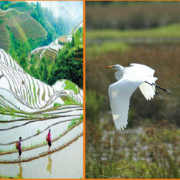South Sudan: Millions trek home to a delicate environment
With a greater sense of collective security and a fast-growing economy fueled by its budding oil industry, most of The Republic of South Sudan is poised for recovery and development at the onset of nationhood.
Although South Sudan’s slate of challenges are not easily enumerable, issues relating to the environment, including land degradation, deforestation and the impact of climate change, must be addressed with urgency. This constellation of challenges threaten the newly independent nation’s long-term peace and stability, food security and sustainable development.
But an effective response requires copious, accurate and reliable data that isn’t readily available. This paucity of information about South Sudan’s environmental landscape is due to unique factors brought about by the more than two decades long civil war with its now northern neighbor. The war, which ended with the signing of the Comprehensive Peace Agreement (CPA) in 2005, displaced nearly a half of the population of 8 million and claimed nearly 2 million lives.
Throughout the years of displacement, previously overgrazed lands and wildlife were naturally replenished to some degree. But as an estimated 4 million people return to their ancestral lands on the cusp of independence in a resource rich but ecologically unsound and economically stagnant society, the natural gains made in restoring the environment is in jeopardy. It would be illogical to suggest that the return of a displaced people is within and of itself the cause of this crisis, rather, it is the lack of information about where people will settle and the state of the environment in those places that is at the core of the problem.
To respond to this challenge, the Government of South Sudan (GoSS) ought to make more coordinated use of the 2005 post-conflict environmental assessment it commissioned UNEP
to conduct. The finding from the UNEP study may be transformed into a resource akin to Virtual Kenya, an online interactive web platform for charting human environmental health with related material for those with no access to the internet. This is one tangible way in which ICTs, including GIS technologies may be used to tackle South Sudan’s environmental challenges.
As I’ve noted in previous blogs focused on South Sudan and the role of ICTs, there is limited scope for the use of high tech ICTs at this point, due to systemic and structural impediments, including literacy, connectivity, access and market environment. However, traditional technologies such as radio ought to be used to provide timely, accurate and contextually appropriate information about environmental conservation. It is important that the farming community, the largest economically active block in the country, be sensitized about this. Land degradation, for instance, is heightened by population pressure, intensification of agriculture, water-logging and salinity, among other things. Both water-logging and salinity are caused by poor irrigation and drainage, deforestation, overgrazing, soil erosion and poverty.
So, as South Sudan claims nationhood, it is imperative that the environment be a priority for the GoSS and its people. A clear ICT strategy with medium to long-term goals is needed. It ought to emphasize how ICTs will be leveraged to improve basic farm extension services to reduce poor soil management, and other agricultural related causes of land degradation. The wider thrust to sensitize the nation about environmental issues ought to also prioritize the well-being of wildlife, much of which was devastated during the war. There is clear economic, environmental and social benefits to be reaped from this.
As with so many nations on the cusp of self-determination, South Sudan can take a path that will secure the fortunes of its people. The preservation of the environment is central to achieving this, and that is only possible if there is national buy-in. Too few governments have been proactive in informing their citizens.






































